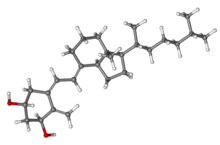Alfacalcidol: Difference between revisions
No edit summary |
Marked this version for translation |
||
| Line 1: | Line 1: | ||
<languages /> | <languages /> | ||
<translate> | <translate> | ||
<!--T:1--> | |||
{{chembox | {{chembox | ||
| Verifiedfields = changed | | Verifiedfields = changed | ||
| Line 87: | Line 88: | ||
}} | }} | ||
<!--T:2--> | |||
'''Alfacalcidol''' (or '''1-hydroxycholecalciferol''') is an analogue of [[vitamin D]] used for supplementation in humans and as a poultry feed additive. | '''Alfacalcidol''' (or '''1-hydroxycholecalciferol''') is an analogue of [[vitamin D]] used for supplementation in humans and as a poultry feed additive. | ||
<!--T:3--> | |||
Alfacalcidol has a weaker impact on [[calcium metabolism]] than [[calcitriol]]; but significant effects on the [[immune system]], including [[regulatory T cells]]. It is considered to be a more useful form of [[vitamin D]] supplementation, mostly due to much longer half-life and lower kidney load. It is the most commonly prescribed vitamin D metabolite for patients with [[end stage renal disease]], given that impaired renal function alters the ability to carry out the second [[hydroxylation]] step required for the formation of the physiologically active form of vitamin D, [[1,25-dihydroxyvitamin D3]]. Alfacalcidol is an active vitamin D3 metabolite, and therefore does not require the second [[hydroxylation]] step in the [[kidney]]. | Alfacalcidol has a weaker impact on [[calcium metabolism]] than [[calcitriol]]; but significant effects on the [[immune system]], including [[regulatory T cells]]. It is considered to be a more useful form of [[vitamin D]] supplementation, mostly due to much longer half-life and lower kidney load. It is the most commonly prescribed vitamin D metabolite for patients with [[end stage renal disease]], given that impaired renal function alters the ability to carry out the second [[hydroxylation]] step required for the formation of the physiologically active form of vitamin D, [[1,25-dihydroxyvitamin D3]]. Alfacalcidol is an active vitamin D3 metabolite, and therefore does not require the second [[hydroxylation]] step in the [[kidney]]. | ||
<!--T:4--> | |||
<!-- Society and culture --> | <!-- Society and culture --> | ||
It was patented in 1971 and approved for medical use in 1978. | It was patented in 1971 and approved for medical use in 1978. | ||
<!--T:5--> | |||
==Trade names== | ==Trade names== | ||
Pharmaceutical trade names include AlphaD and One-Alpha. | Pharmaceutical trade names include AlphaD and One-Alpha. | ||
<!--T:6--> | |||
==Other animals== | ==Other animals== | ||
Used as a poultry feed additive, it prevents [[tibial dyschondroplasia]] and increases [[phytate]] [[bioavailability]]. | Used as a poultry feed additive, it prevents [[tibial dyschondroplasia]] and increases [[phytate]] [[bioavailability]]. | ||
<!--T:7--> | |||
{{Vitamins}} | {{Vitamins}} | ||
{{Vitamin D receptor modulators}} | {{Vitamin D receptor modulators}} | ||
<!--T:8--> | |||
{{二次利用|date=13 December 2023}} | {{二次利用|date=13 December 2023}} | ||
[[Category:Secosteroids]] | [[Category:Secosteroids]] | ||
Latest revision as of 22:20, 12 April 2024

| |

| |
| Names | |
|---|---|
| Preferred IUPAC name
(1R,3S,5Z)-4-Methylidene-5-[(2E)-2-{(1R,3aS,7aR)-7a-methyl-1-[(2R)-6-methylheptan-2-yl]octahydro-4H-inden-4-ylidene}ethylidene]cyclohexane-1,3-diol | |
| Other names
Alphacalcidol; 1-Hydroxycholecalciferol
| |
| Identifiers | |
3D model (JSmol)
|
|
| ChEBI | |
| ChEMBL | |
| ChemSpider | |
| DrugBank | |
| KEGG | |
PubChem CID
|
|
| UNII | |
| |
| |
| Properties | |
| C27H44O2 | |
| Molar mass | 400.64 g/mol |
| Melting point | 136 °C (277 °F; 409 K) |
| 0.016 g/100 mL | |
| Pharmacology | |
| A11CC03 (WHO) | |
| License data | |
| Legal status |
|
Alfacalcidol (or 1-hydroxycholecalciferol) is an analogue of vitamin D used for supplementation in humans and as a poultry feed additive.
Alfacalcidol has a weaker impact on calcium metabolism than calcitriol; but significant effects on the immune system, including regulatory T cells. It is considered to be a more useful form of vitamin D supplementation, mostly due to much longer half-life and lower kidney load. It is the most commonly prescribed vitamin D metabolite for patients with end stage renal disease, given that impaired renal function alters the ability to carry out the second hydroxylation step required for the formation of the physiologically active form of vitamin D, 1,25-dihydroxyvitamin D3. Alfacalcidol is an active vitamin D3 metabolite, and therefore does not require the second hydroxylation step in the kidney.
It was patented in 1971 and approved for medical use in 1978.
Trade names
Pharmaceutical trade names include AlphaD and One-Alpha.
Other animals
Used as a poultry feed additive, it prevents tibial dyschondroplasia and increases phytate bioavailability.
| この記事は、クリエイティブ・コモンズ・表示・継承ライセンス3.0のもとで公表されたウィキペディアの項目Alfacalcidol(13 December 2023編集記事参照)を素材として二次利用しています。 Item:Q22021 |